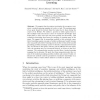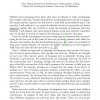11 search results - page 2 / 3 » eelc 2006 |
EELC
2006
13 years 11 months ago
2006
How does a shared lexicon arise in population of agents with differing lexicons, and how can this shared lexicon be maintained over multiple generations? In order to get some insig...
EELC
2006
13 years 11 months ago
2006
Abstract. According to the functional approach to language evolution (inspired by cognitive linguistics and construction grammar), grammar arises to deal with issues in communicati...
EELC
2006
13 years 11 months ago
2006
We present a neural-competitive learning model of language evolution in which several symbol sequences compete to signify a given propositional meaning. Both symbol sequences and p...
EELC
2006
13 years 11 months ago
2006
Abstract. We suggest that the primary motivation for an agent to construct a symbol-meaning mapping is to solve a task. The meaning space of an agent should be derived from the tas...
EELC
2006
13 years 11 months ago
2006
nstructional schemas, both specific and abstract. Children are thought to start out with concrete pieces of language and to gradually develop more schematic constructions. All cons...


